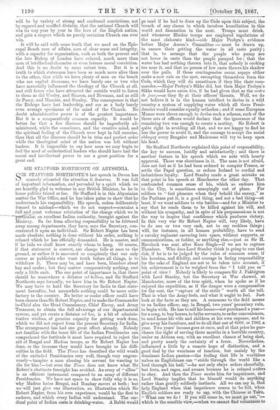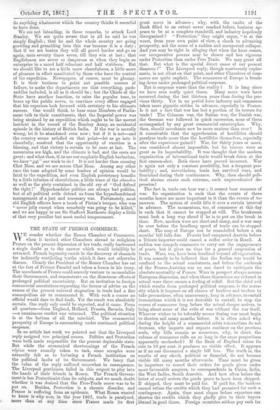SIR STAFFORD NORTHCOTE ON ABYSSINIA.
SIR STAFFORD NORTHCOTE'S last speech in Devon has scarcely attracted the attention it deserves. It was full of important information, and pervaded by a spirit which we are heartily glad to welcome in any British Minister, be he in home politics friend or foe. Sir Stafford is in this Abyssinian matter the War Office, and he has taken pains to show that he understands his responsibility. His speech, unless deliberately framed to mislead—which we do not suspect—contains a full and most welcome refutation of the charge which we in "~pnrairrar, on excellent Indian authority, brought against the Ministry. So far from allowing responsibility to be frittered away among departments, they have, says the Secretary, con- centrated it upon an individual. Sir Robert Napier has been made absolute, nothing is done without his order, nothing is refused which he has officially demanded. He is master, and if he fails we shall know exactly whom to hang. Of course, if that statement is correct, our charge falls at once to the ground, or rather it is answered so completely that our only course as publicists who want truth before all things, is to withdraw it. There may be, and have been, blunders about hay and mules ; but they matter comparatively nothing, cost only a little cash. The one point of importance is, that there should be somewhere a dictator ad bellum, and Sir Stafford Northcote says formally, we have him in Sir Robert Napier. We may have to hold the Secretary for India to that state- ment hereafter, but meanwhile nothing could be more satis- factory to the country. No better or cooler officer could have been chosen than Sir Robert Napier, and to make the Commander in-Chief also the Head Commissary, Chief Envoy, and Army Treasurer, to obtain the full advantage of our departmental system, and yet create a dictator ad hoc, is a bit of adminis- trative wisdom, of genuine capacity for getting work done, which we did not expect from the present Secretary for India. The arrangement has had one great effect already. Nobody not familiar with the inner life of the Indian Presidencies can comprehend the fortitude it must have required to reject the aid of Bengal and Madras troops, as Sir Robert Napier has done, or the increase they would have brought to his diffi- culties in the field. The Times has described the wild wrath of the excluded Presidencies very well, though very ungene- rously—imagine a man abusing his servant for wanting to die for him t—but even the Times does not know what Sir Robert's obstinate foresight has avoided. An army of "allies" is an efficient instrument compared to an army of different Presidencies. We have not space to show fully why it is so, why Madras hates Bengal, and Bombay sneers at both ; but we will just give one illustration, an illustration which Sir Robert Napier, from his own experience, would be the first to endorse, and which every Indian will understand. The car- dinal point of Indian caste is drinking-water. A Rabbi would go mad if he had to draw up the Code upon this subject, the breach of any clause in which involves humiliation in this world and damnation in the next. Troops must drink, and whenever Hindoo troops are employed regulations of the most elaborate kind—vide Major Probyn's evidence before Major Anson's Committee — must be drawn up, to ensure their getting the water in all caste purity ; that is, to arrange that the people who pump are not lower in caste than the people pumped for ; that the water has had nothing thrown into it, that nobody is cooking too near it, and that no person of low caste throws his shadow over the pails. If these contingencies occur, sepoys either make a new rule on the spot, exempting themselves from the Code, which they will do sometimes, if they like their com- mander,—Major Probyn's Sikhs did, but then Major Probyn's Sikhs would have eaten him, if he had given that as the ordre de jour,—or they fly at their officers' throats. Well, we do not believe it is in the human intellect to devise in a wild country a system of supplying water which all three Presi- dencies would consider equally orthodox ; and if some European Munoo were clever enough to devise such a scheme, each of the three sets of officers would declare that the ignorance of the remaining two was enough to create a mutiny. Sir Robert is quite right in avoiding all that, and we are happy to find he has the power to avoid it, and the courage to accept the social, obloquy every Bengalee and Madrassee will try to heap upon his head.
Sir Stafford Northcote explained this point of responsibility, the key to success, lucidly and satisfactorily ; and there is another feature in his speech which we note with hearty approval. There was cheeriness in it. The man is not afraid, does not feel as if he had been ordered to conquer France, or settle the Papal question, or reduce Ireland to cordial and industrious loyalty. Lord Stanley made a great mistake on that point in his speech at Manchester the other day. That confounded common sense of his, which so endears him to the City, is sometimes annoyingly out of place. For soldiers to ," feel pleasure when they behold the enemy," as the Puritans put it, is a good thing, and not a bad thing—at least, if we want soldiers to win battles—and for a Minister to say that he sends them to be killed against his will, and without his sympathy, and in spite of his prepossessions is not the way to inspire that confidence which produces victory. In this very war Sir Robert Napier will, very likely, have to do one or two very rash, not to say reckless things ; will, for instance, in all human probability, have to send a cavalry regiment careering into space, without supports, or communications, or fodder, or anything else,—just as Sir H. Havelock was sent after Koer Singh—if we are to capture Theodore. Who does Lord Stanley think is going to run that risk, if he is to be judged by the rules of common sense, if his heroism, and fidelity, and courage in facing responsibility for the sake of England are not to be taken into account, if his achievement is to be weighed from the "I told you so" point of view ? Nobody is likely to compare Sir J. Pakhigton with Lord Stanley, but the Secretary at War showed, at Manchester, more of the true spirit, when he spoke as if .he- enjoyed the expedition, as if the danger were a compensation for the cost, the "rapture of the strife" worth all the toil. That is what the Army feels, and what it ought to feel. Just look at the facts as they are. A summons to the field means to an Indian officer, say, in Bengal, two years' -pecuniary ruin, to begin with. He has to sell his house—not purchased a year— for a song, to buy horses, to bribe servants, to order conveniences, to send home his wife and children at his own expense, and to give away his furniture, and to do all that out of 600/. or 700/. a. year. Two years' income goes at once, and at that price he pur- chases the right of serving three months in a horrible country, under an African sun, with an excellent chance of being shot, and pretty nearly the certainty of a fever. Nevertheless, influenced a little by a remote hope of distinction, and a good deal by the weariness of inaction, but mainly by the dominant Indian passion—the feeling that life is worthless unless an Englishman can "stride through the world like a lord through his hall,"—he not only obeys orders cheerfully, but frets, and rages, and swears because he is refused orders to obey. And then the Times snubs him for impatience, and Lord Stanley implies that he himself would do anything rather than gratify soldierly instincts. All we can say is, God. help England when that impatience ceases to be felt, when English soldiers are ready to say, with the Chinese at Taku, "What can we do ? If you will come in, we must go out,"— which is the sensible view,—when we cannot find volunteers to do anything whatsoever which the country thinks it essential to have done.
We are not intending, in these remarks, to attack Lord Stanley. We are quite aware that in all he said he was simply English ; that he and the whole country are going growling and grumbling into this war because it is a duty ; that if we are beaten they will all growl harder and go on again, unto seventy times seven, till they win at last ; that Englishmen are never so dangerous as when they begin an enterprise in a mood half reluctant and half stubborn. But we should like to see a little more cheerfulness, a little more of pleasure in effort manifested by those who have the control of the expedition. Newspapers, of course, must be gloomy. It is their business to point out possible sources of failure, to make the departments see that everything, pack- saddles included, is all as it should be ; but the Chiefs of the State have another function, to raise the popular tone, to brace up the public nerve, to convince every officer engaged that his superiors look forward with certainty to his ultimate success. One would think, to hear some Members of Parlia- ment talk to their constituents, that the Imperial power was being strained by an expedition which ought to be the merest incident in the record of the Bombay Army, an accidental episode in the history of British India. If the war is morally wrong, let it be abandoned even now ; but if it is not—and the country seems satisfied on that point—let us go into it cheerfully, resolved that the opportunity of exertion is a blessing, and that victory is certain to be ours at last. The mountains are high, and the climate is bad, and the costs are great; and what then, if, to use our emphatic English barbarism, we have "gqt" our work to do ? It is not harder than crossing Chat Moss, and we are across Chat Moss. Among any other race the tone adopted by some leaders of opinion would be fatal to the expedition, and even English persistency benefits by a little infusion of cheerfulness, a little trace of the abandon as well as the piety contained in the old cry of "God defend the right !" Hypochondriac politics are always bad politics, but of all political evils defend us from the hypochondriacal management of a just and necessary war. Fortunately, most old English officers have a touch of Picton's temper, who was "never jolly except when somebody was going to be killed," and we are happy to see Sir Stafford Northcote display a little of that very peculiar but most useful temperament.



































 Previous page
Previous page